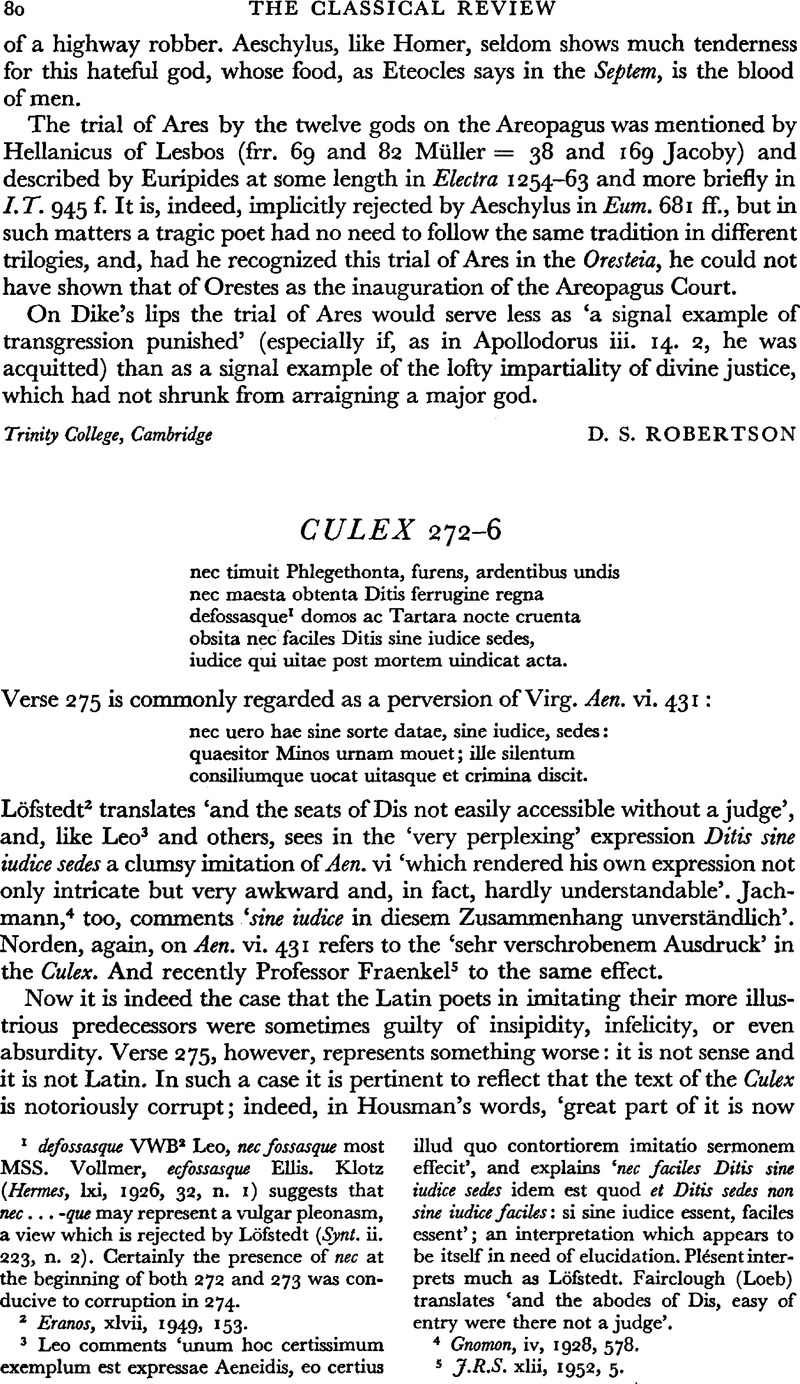Article contents
Culex 272–6
Published online by Cambridge University Press: 13 February 2009
Abstract

- Type
- Review Article
- Information
- Copyright
- Copyright © The Classical Association 1953
References
page 80 note 1 defossasque VWB2 Leo, nec fossasque most MSS. Vollmer, ecfossasque Ellis. Klotz (Hermes, lxi, 1926, 32, n. 1) suggests that nec…-que may represent a vulgar pleonasm, a view which is rejected by Löfstedt (Synt. ii. 223, n. 2). Certainly the presence of nec at the beginning of both 272 and 273 was conducive to corruption in 274.
page 80 note 2 Eranos, xlvii, 1949, 153.
page 80 note 3 Leo comments ‘unum hoc certissimum exemplum est expressae Aeneidis, eo certius illud quo contortiorem imitatio sermonem effecit’, and explains ‘nec faciles Ditis sine iudice sedes idem est quod et Ditis sedes non sine iudice faciles: si sine iudice essent, faciles essent’; an interpretation which appears to itself in need of elucidation. Plésent interprets much as Löfstedt. Fairclough (Loeb) translates ‘and the abodes of Dis, easy of entry were there not a judge’.
page 80 note 4 Gnomon, iv, 1928, 578.
page 81 note 5 J.R.S. xlii, 1952, 5.
page 81 note 1 C.R. xvi, 1902, 339. Cf. Ellis, p. xi: ‘(Culicis) multis … uitiis laborantis, prae-cipue in prooemio … et uu. 260–380, quibus uix ulla pars horum opusculorum interpretes magis detinuit exercuitque.’
page 81 note 2 Cf. Manil. iv. 736 ff. ‘nee te, Bacche, pari donantem munere terras | atque alias aliis fundentem collibus uuas, | cinnama nec totis passim nascentia campis’ (= ‘et te munere non pari donantem’ and ‘et cinnama non totis’ Housman, q.v. ad loc. and on i. 656 and ii. 41), Luc. i. 72 ‘nimioque graues sub pondere lapsus | nee se Roma ferens’ (= et Roma se non ferens), id. i. 85, etc.
page 81 note 3 Cf. the next verse (276), where for uitae—acta Γ has uitem (Γ1)—actam.
page 81 note 4 Minos assigns the sedes; cf. 374 ff. ‘Phle-gethonta …, quo, maxime Minos, | con-scelerata pia discernis uincula sede. | ergo iam causam mortis, iam dicere uitae | uerberibus beribus saeuae cogunt ab iudice Poenae’ (sub Scaliger).
page 81 note 5 For examples of this type of error see Havet, Manuel, §§ 1087 ff.
page 81 note 6 Corp. Script. Eccl. Lat. xxx, 1894. The poems are also printed in Migne's Patrol., vol. lxi, according to the text mainly of Lebrun.
page 81 note 7 So Hartel regardless of metre. For qui the codd. read: heu qui ADQ, aeui GR, heu cett. (so ed. princ, Lebrun). The right reading must, I think, be huc; cf. Carm. xvii. 318 ‘hue ad nos animo recurre’. The commas after beatus and tempore should be deleted.
page 82 note 1 Lebrun's punctuation leaves us no wiser: ‘et ante rogantes, | uerane te facies? (aiunt) …’.
page 82 note 2 Omitted from Hartel's list of sources (p. 384).
page 82 note 3 Verses 222–3 will then run: ‘uerane tu facies?’ aiunt, ‘tune ille beatus redderis huc tanto nobis post tempore Felix?’
page 82 note 4 Havet, l.c.
- 1
- Cited by


